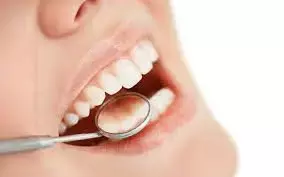- Home
- Medical news & Guidelines
- Anesthesiology
- Cardiology and CTVS
- Critical Care
- Dentistry
- Dermatology
- Diabetes and Endocrinology
- ENT
- Gastroenterology
- Medicine
- Nephrology
- Neurology
- Obstretics-Gynaecology
- Oncology
- Ophthalmology
- Orthopaedics
- Pediatrics-Neonatology
- Psychiatry
- Pulmonology
- Radiology
- Surgery
- Urology
- Laboratory Medicine
- Diet
- Nursing
- Paramedical
- Physiotherapy
- Health news
- Fact Check
- Bone Health Fact Check
- Brain Health Fact Check
- Cancer Related Fact Check
- Child Care Fact Check
- Dental and oral health fact check
- Diabetes and metabolic health fact check
- Diet and Nutrition Fact Check
- Eye and ENT Care Fact Check
- Fitness fact check
- Gut health fact check
- Heart health fact check
- Kidney health fact check
- Medical education fact check
- Men's health fact check
- Respiratory fact check
- Skin and hair care fact check
- Vaccine and Immunization fact check
- Women's health fact check
- AYUSH
- State News
- Andaman and Nicobar Islands
- Andhra Pradesh
- Arunachal Pradesh
- Assam
- Bihar
- Chandigarh
- Chattisgarh
- Dadra and Nagar Haveli
- Daman and Diu
- Delhi
- Goa
- Gujarat
- Haryana
- Himachal Pradesh
- Jammu & Kashmir
- Jharkhand
- Karnataka
- Kerala
- Ladakh
- Lakshadweep
- Madhya Pradesh
- Maharashtra
- Manipur
- Meghalaya
- Mizoram
- Nagaland
- Odisha
- Puducherry
- Punjab
- Rajasthan
- Sikkim
- Tamil Nadu
- Telangana
- Tripura
- Uttar Pradesh
- Uttrakhand
- West Bengal
- Medical Education
- Industry
Increased bisphenol A release tied to high risk of local and systemic toxicity: Study

Increased release of bisphenol A (BPA) tied with high risks of local and systemic toxicity, according to a recent study published in the Journal of Biomedical Materials Research Part B: Applied Biomaterials.
The main aim of this study was to perform an integrative review on the release of bisphenol A (BPA) from resin-matrix composites and potential toxic effects. A bibliographic search was performed on the PubMed platform using the following keywords: "Bisphenol A" OR "BPA" AND "resin composite" OR "composite resin" AND "toxicity" OR "cytotoxicity" OR "release". Inclusion criteria involved in vitro and in vivo studies on the release and toxicity of bisphenol A (BPA).
The results of the study are as follows:
- The release of bisphenol A (BPA) from resin-matrix composites due to insufficient polymerization and/or degradation of the polymeric matrix.
- Bisphenol A (BPA) is part of the organic matrix of resin-matrix composites and may be hydrolysed in human saliva, although studies report that low doses might not be detected by traditional chemical analysis.
- Studies exposing zebrafish embryos to different concentrations of Bis-GMA, showed 55% mortality at 10 μM Bis-GMA while 30% mortality was recorded at 1 μM Bis-GMA. In patients, a bisphenol A (BPA) concentration of around 2.09 × 10−2 μg/ml was found in the saliva after placement of lingual orthodontic retainers with resin-matrix composites.
- Also, the bisphenol A (BPA) molecule can be swallowed and absorbed by the oral/gastrointestinal mucosa, which might result in systemic toxicity.
- The degradation of resin-matrix composites and release of bisphenol A (BPA) in oral environment are dependent on the organic matrix content and on the polymerization method.
Thus, the researchers concluded that an increased release of bisphenol A (BPA) can lead to the absorption into oral and gastrointestinal mucosa with high risks of local and systemic toxicity.
Reference:
An integrative review on the toxicity of Bisphenol A (BPA) released from resin composites used in dentistry by Lígia Lopes-Rocha et al. published in the Journal of Biomedical Materials Research Part B: Applied Biomaterials.
Dr. Shravani Dali has completed her BDS from Pravara institute of medical sciences, loni. Following which she extensively worked in the healthcare sector for 2+ years. She has been actively involved in writing blogs in field of health and wellness. Currently she is pursuing her Masters of public health-health administration from Tata institute of social sciences. She can be contacted at editorial@medicaldialogues.in.
Dr Kamal Kant Kohli-MBBS, DTCD- a chest specialist with more than 30 years of practice and a flair for writing clinical articles, Dr Kamal Kant Kohli joined Medical Dialogues as a Chief Editor of Medical News. Besides writing articles, as an editor, he proofreads and verifies all the medical content published on Medical Dialogues including those coming from journals, studies,medical conferences,guidelines etc. Email: drkohli@medicaldialogues.in. Contact no. 011-43720751


